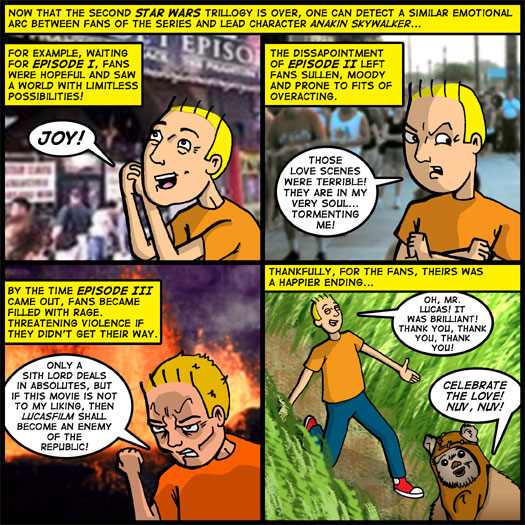Is it weird that I had to employ the internet to uncover the lyrics to the Ewok celebration song from Return of the Jedi? I wasn’t sure if it was “Nub, nub!” or “Nuv, nuv!”
I suppose if it was “Nub, nub” the phrase “celebrate the love” would take on an entirely different meaning!
Family comic! Family comic! Bad artist! Bad!
We didn’t get a chance to see Star Wars: Episode III – Revenge of the Sith over the weekend. Part of it was due to a busy schedule, but part of it was just good sense to stay away. We knew the theaters would be packed, and since I saw the movie on Wednesday, there was no need to torture ourselves. We’ll probably see it tonight when there will be less people in the theaters.
Anyway, instead of combating the nerd hordes, Cami and I instituted a little counter-programming this weekend and saw Enron: The Smartest Guys in the Room. It’s a documentary adapted from the book by Bethany McLean and Peter Elkind.
What can I say about the film? It’s not a real heart-warmer, obviously. I guess while watching it, I kept thinking of that old saying “If you’re not outraged, you’re not paying attention.” There’s plenty that Ken Lay, Jeff Skilling and Andrew Fastow perpetrated to be outraged over.
I won’t go into the details because I know reading about white collar corporate greed is just about as exciting as writing about it, but for your own edification, you should see this movie.
Co-author Bethany McLean hits the nail on the head very early in the film when she comments (and I’m paraphrasing) that the Enron scandal seems to have become this obtuse construct in the minds of the average American. Most people think that the scandal revolves around complicated transaction and the pocketing of hidden assets. That the money trail is too complicated to follow and therefore not worth attempting to understand.
In reality, the story of Enron is more about people. The hubris over the over-competitive and a compulsory need to prove superiority above authority. Their theories as to the personal motivations of Skilling in particular could be a wonderful psychological case study.
The movie touches lightly on a Republican conspiracy to oust California’s Democratic Governor Gray Davis by tracing the responsibilities of the rolling blackouts his state suffered back to Enron. This isn’t the focus of the film by any means. Ultimately, Enron was responsible for the blackouts, but money was their prime motivation. Still, it’s hard to deny their association to the Bush administration considering Enron was the largest corporate backer of that campaign.
But I’m getting off track. I don’t mean to politicize things and I don’t want to give the wrong impression. Ultimately, the movie takes what most perceive to be a very complicated issue and walks you through it step-by-step. After watching it, the puzzle pieces fit together much more easily and for that, I think it’s worth your movie going dollar.
For example, waiting for Episode I, fanswere hopeful and saw a world with limitelss possibilities!
Joy!
The disappointment of Episode II left fans sullen, moody and prone to fits of overacting.
Those love scenes were terrible! They are in my very soul... Tormenting me!
By the time Episode III came out, fans became filled with rage. Threatening violence if they didn't get their way.
Only a Sith Lord deals in absolutes, but if this movie is not to my liking, then Lucasfilm shall become an enemy of the Republic!
Thankfully, for the fans, theirs was a happier ending...
Oh, Mr. Lucas! It was brilliant! Thank you, thank you, thank you!
Celebrate the love! Nuv, nuv!






